After Pelosi says he's 'engaged in a cover-up,' Trump says angrily, 'I don't do cover-ups'
The president spoke at a last-minute news conference in the Rose Garden.
President Donald Trump responded angrily on Wednesday to House Speaker Nancy Pelosi's claim earlier in the day that he's 'engaged in a cover-up."
"I don't do cover-ups," Trump said in remarks in the White House Rose Garden after reporters were given just a few minutes advance notice.
Trump spoke just after Pelosi and Senate Minority Leader Sen. Chuck Schumer met with him to find common ground on infrastructure funding.
"There's was no collusion, no obstruction. We've been doing this since I've been president," he said.
"I've said from the beginning, right from the beginning that you can't go down both tracks. You can go down the investigation track or you can go down the investment track," he said he told the Democratic leaders in what appears to have been a brief, contentious encounter.
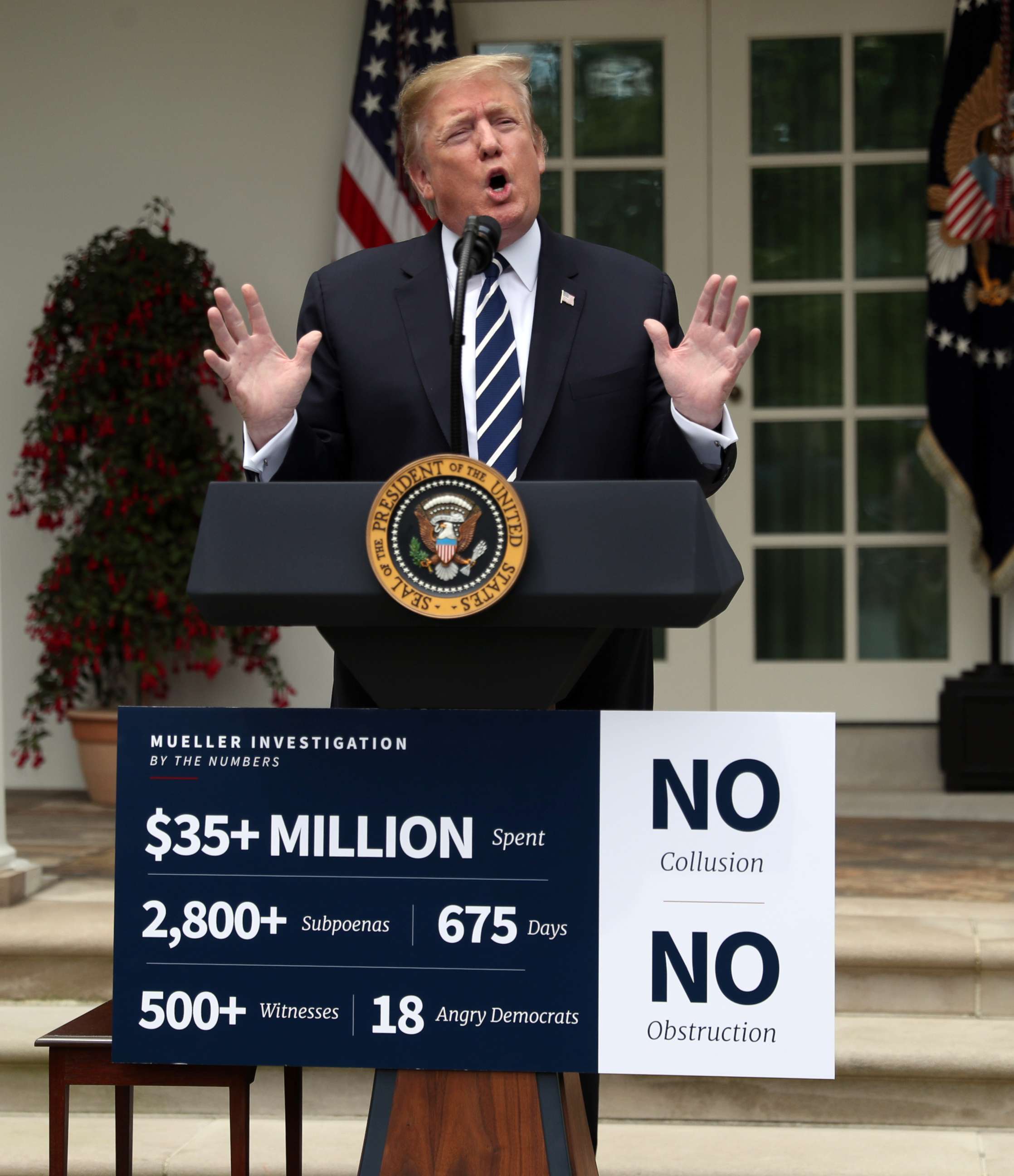
Regarding the evolving bipartisan plan to spend $2 trillion on infrastructure, Trump said he told Pelosi and Schumer: "You can't do it under these circumstances. So, get these phony investigations over with."
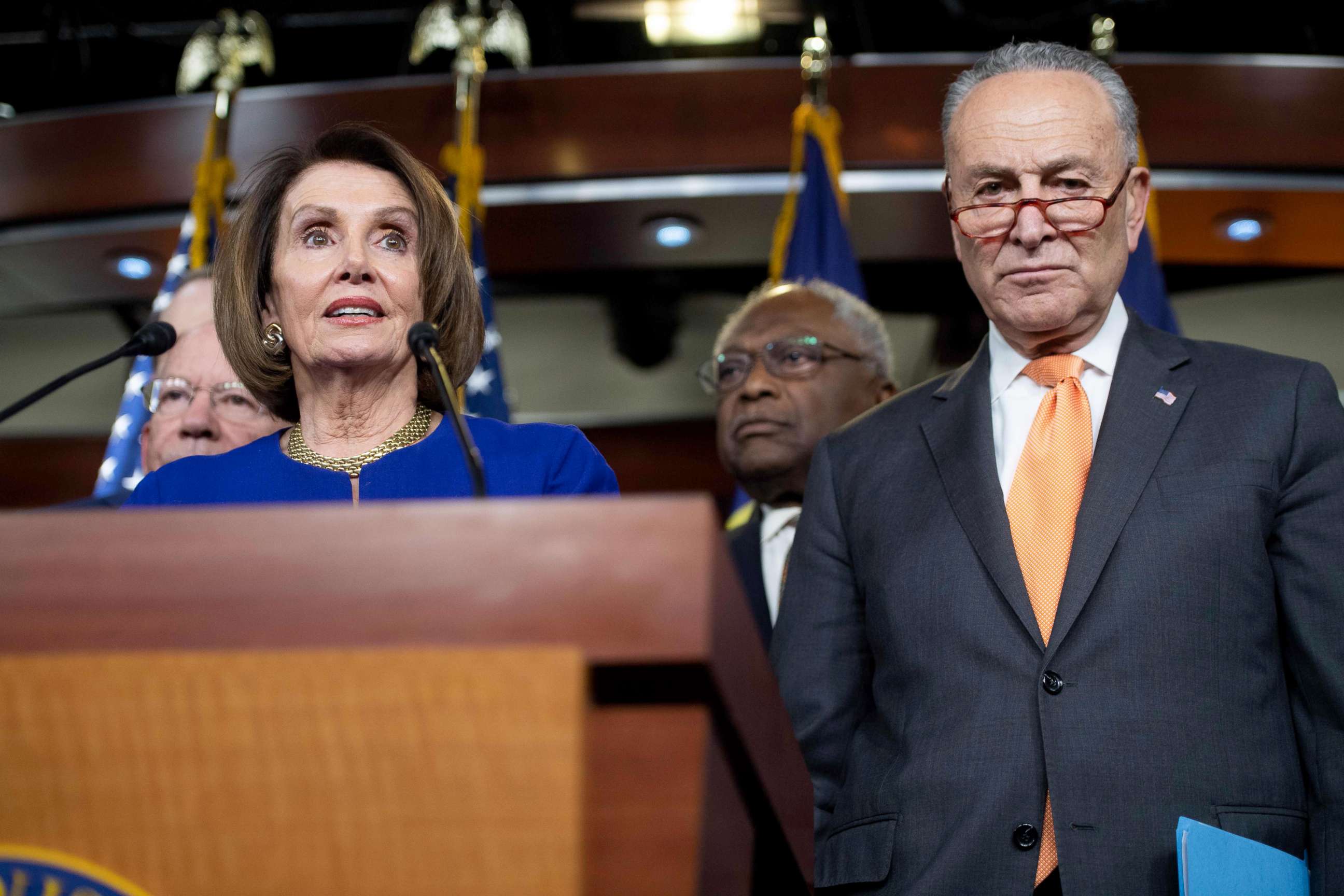
Minutes later, in a news conference of their own after they returned to the Capitol, Pelosi and Schumer shot back.
"To watch what just happened in the White House would make your jaw drop," Schumer said.
He said the president's remarks were not spur-of-the-moment but "a pre-planned excuse" because Trump wanted to avoid having to raise taxes to pay for an infrastructure plan. Schumer cited a sign placed on the president's podium and a paper he held up listing details and costs of the Mueller investigation that he said must have been prepared well ahead of time.
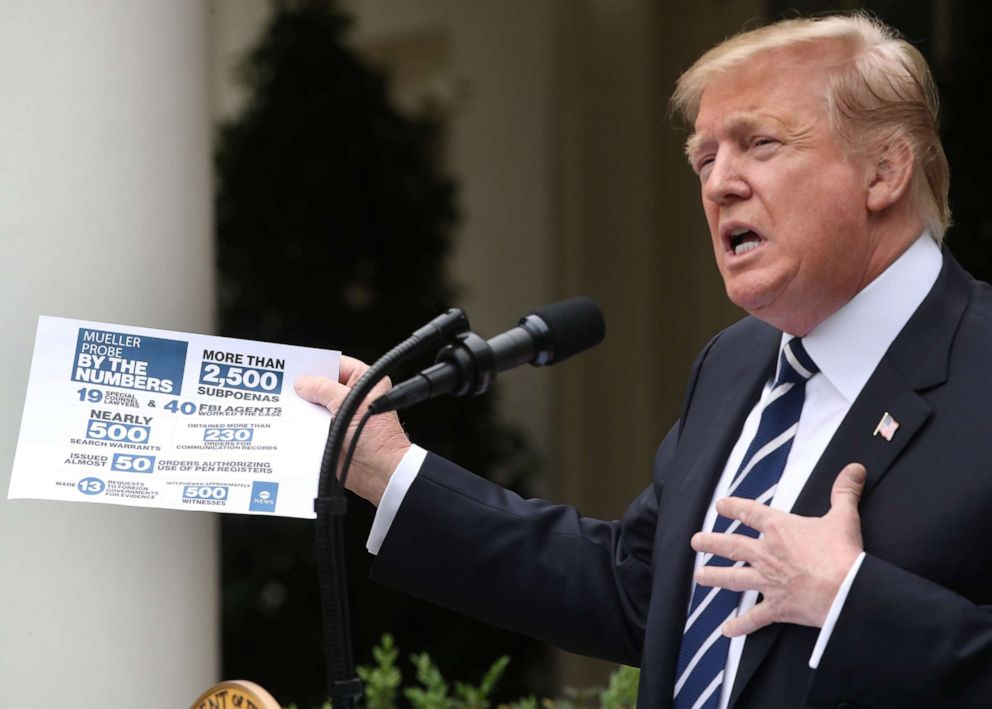
What Trump held up was actually a copy of an ABC News graphic -- seen just below -- on the Mueller investigation.
But notably, he did not hold up a second page of that graphic -- seen above on the right -- that details the numbers of indictments, guilty pleas and people sent to prison.
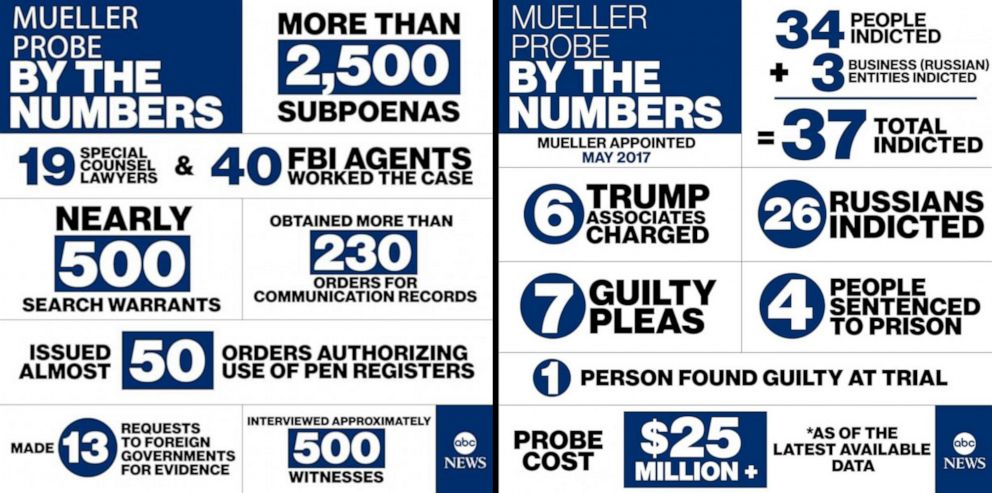
Pelosi did not directly address the "cover-up" language she and the president used but said "we went in in a spirit of bipartisanship" to the White House meeting and that Trump "took a pass" on a chance to do a bipartisan infrastructure effort. "It makes me wonder why he did," she said.
"I pray for the President of the United States," she said. "I pray for the United States of America."
Shortly afterward, Pelosi told an audience at a Washington forum that the White House meeting with Trump was "very strange."
"The president is obstructing justice and he's engaged in a cover-up. And that could be an impeachable offense," she said.
Pelosi had emerged from a closed-door meeting with all House Democrats on Wednesday morning, including a growing number pressuring her to move forward with an impeachment inquiry, saying, "We believe that no one is above the law, including the President of the United States. And we believe the President of the United States is engaged in a cover-up."
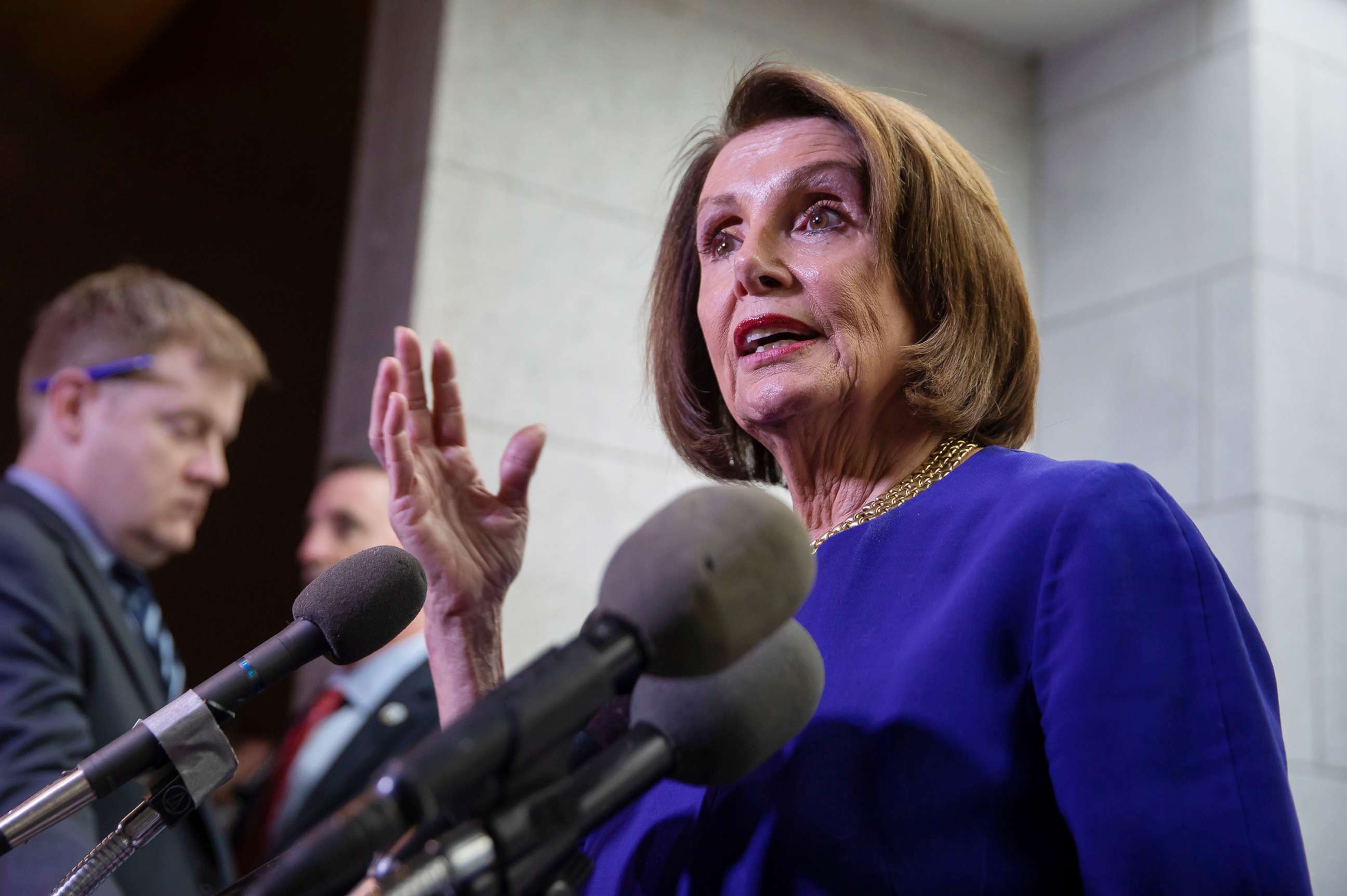
Pelosi, along with five Democratic chairs, gave rank-and-file members an overview of the House’s ongoing investigations into the Trump administration.
Afterwards, Pelosi denied that there are cracks in her Democratic ranks.
“Our members are fine. You all see something that is really not happening in our caucus,” Pelosi told ABC News’ Senior Congressional Correspondent Mary Bruce. “Our members are honoring their oath of office. They have different views, but there’s no division.”
During the caucus meeting, Pelosi urged the group to stay the course, pointing to the House’s recent success in court after a federal judge upheld Democrats’ subpoena of Trump’s financial records, and the Justice Department’s agreement to comply with a House Intelligence Committee subpoena for counterintelligence materials related to the Mueller investigation.
“We do believe that it's important to follow the facts. We believe that no one is above the law, including the president of the United States,” she said.
She called it a "very productive meeting" but was apparently sticking with her previous strategy of having various Democratic-led committees conduct separate investigations, including the House Judiciary Committee led by Rep. Jerry Nadler, and then deciding later whether the politically-risky move of impeachment was warranted.
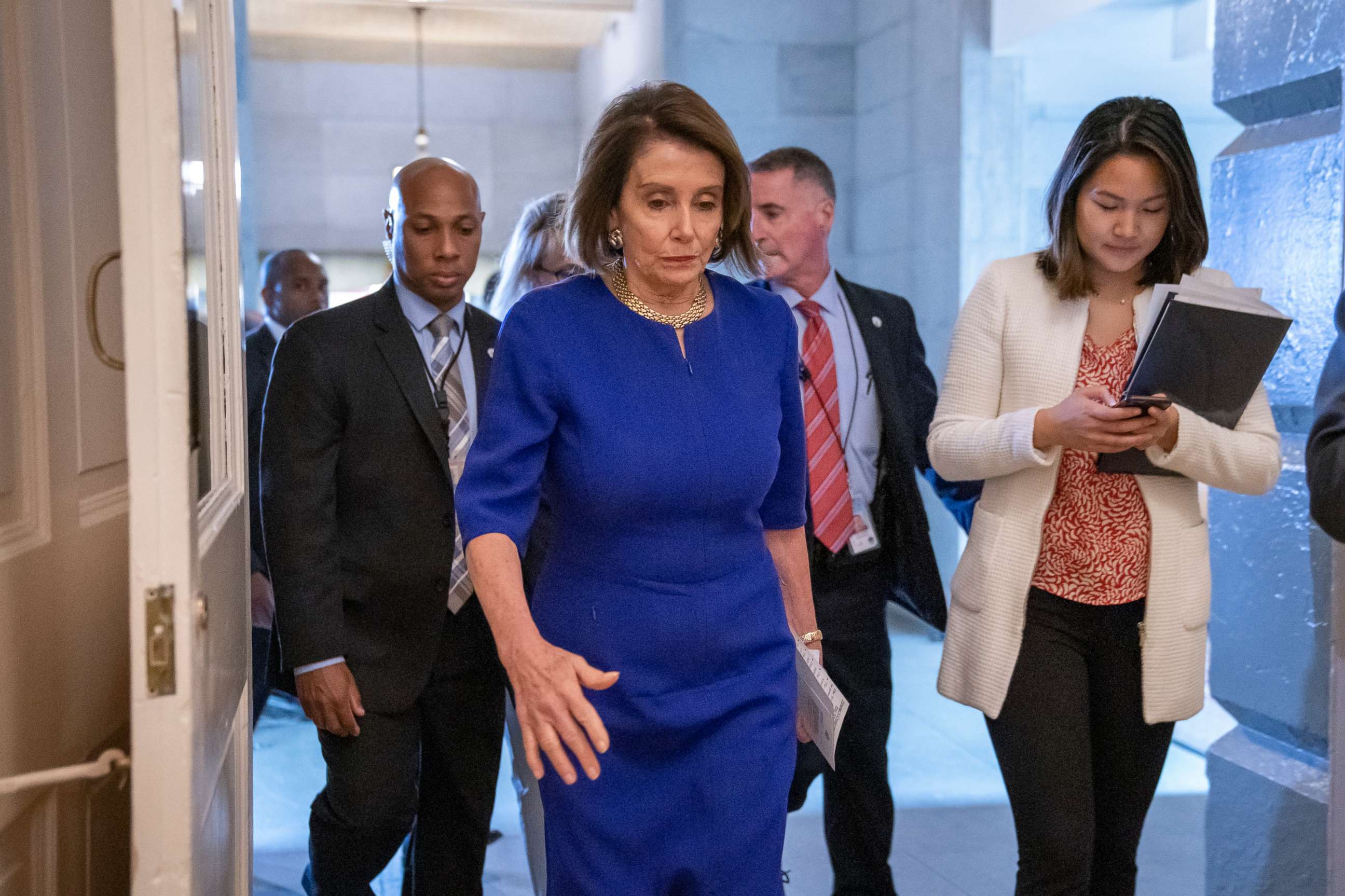
"Jerry Nadler spoke in the beginning to give us a context for all of this," she said. "It was a very positive meeting, a respectful sharing of ideas, I think a very impressive presentation by our chairs. We do believe that it is important to follow the facts.."
"We do have our legislative agenda that we are moving forward on," she said.
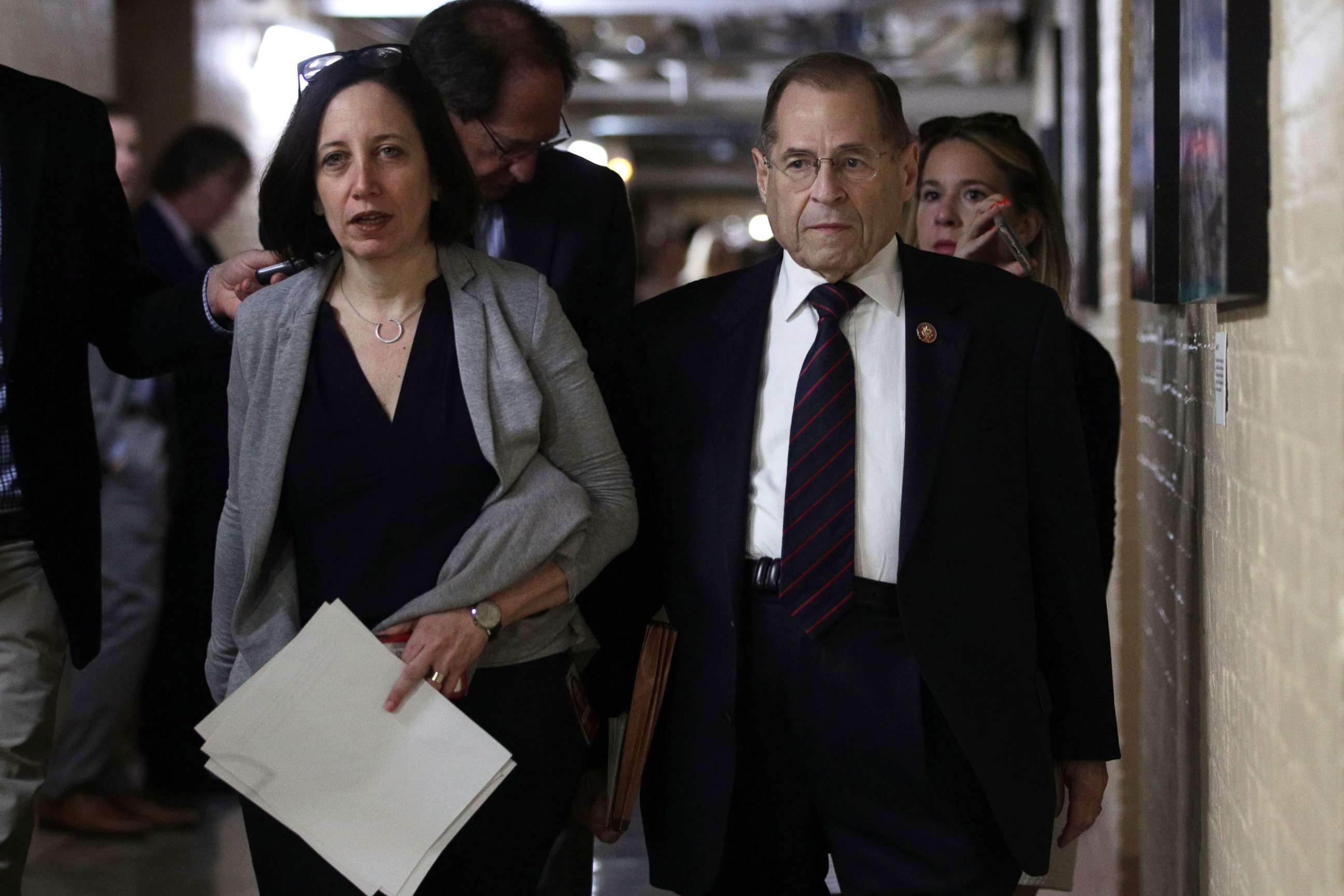
Other Democrats, including House Financial Services Chair Maxine Waters, D-California, and several rank-and-file members, reaffirmed their support for impeachment, as discussion of opening an impeachment inquiry has surfaced on Capitol Hill this week.
“We have a responsibility to impeach him,” Waters told colleagues behind closed doors, which was met with some applause.
“No one is above the law,” said Rep. David Cicilline, D-Rhode Island, one of a handful of House Judiciary Committee members to call for impeachment after former White House counsel Don McGahn did not comply with a subpoena to appear before the panel.
Rep. Jared Huffman, D-California, another impeachment advocate, made the case to colleagues that Republicans – including Rep. Justin Amash of Michigan and George Conway, the conservative lawyer and husband of White House advisor Kellyanne Conway – are now supportive of the effort.
“I hope the message is not that we have to wait months and months for all of these things to wind through the courts.” he said after the meeting. “Because that would essentially be a slow-walk strategy of betting everything on the election, and punting, essentially, our constitutional duty in this moment.” (AUDIO)
The meeting appeared to change few minds in the caucus.
Freshman Rep. Donna Shalala, D-Florida, said it would be “irresponsible” for Democrats to use impeachment to help the committees collect documents and information.
“We’ve got to follow the facts,” Rep. Lucy McBath, D-Georgia, a moderate freshman member of the House Judiciary Committee, told ABC News. “There’s more information that we need before we can make a decision like that.”
Two senior Democratic aides who attended the meeting said that about two-thirds of members who spoke up during the caucus discussion urged lawmakers to stay the course. The aides downplayed the growing calls for impeachment – now topping 26 lawmakers – as a minority view among 235 members.
Rep. Mark Pocan, who announced his support Tuesday for an impeachment inquiry, explained his stance, telling reporters “it’s the president’s conduct,” particularly in the wake of the Mueller report, that has given more Democrats the impression that there is a “cover up.”
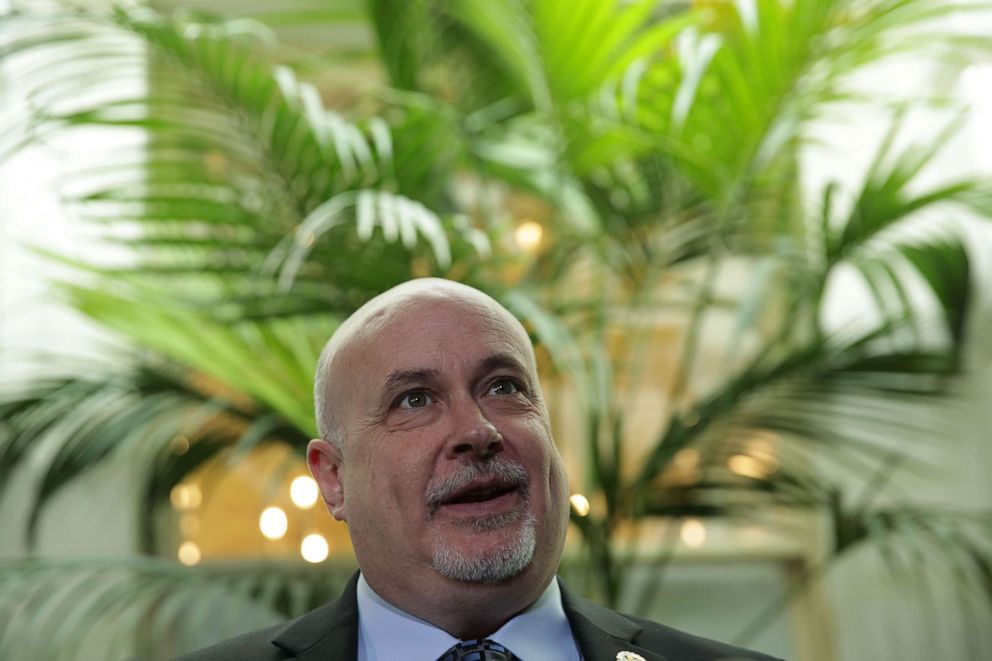
“I still feel very strongly that we need to do something stronger than what Congress has been doing,” Pocan, D-Wis., said. “The Mueller report may have laid out very serious charges of obstruction, and he said it’s up to Congress to deal with that, but more importantly it’s the conduct that’s happened since then. It’s the continued refusal to have people come and be witnesses in Congress. It’s starting to look more like a cover up. And continued obstruction.”
Despite being faced with frustrated Democrats calling for her to take a harder-line, Pelosi on Tuesday continued to try to deflect the reality that her caucus is beginning to shift toward impeachment, telling ABC News, "No," when asked if she was under increased pressure to impeach Trump.
"We don't have division," she told reporters.
But after Trump blocked former White House counsel Don McGahn from testifying Tuesday, one after the other, several Democrats publicly bucked Pelosi, including Pocan, a co-chair of the Congressional Progressive Caucus, who said Trump's "stonewalling" of Congress "only enhances the President's appearance of guilt," and "has pushed Congress to a point where we must start an impeachment inquiry."
"Regrettably, the President's most recent actions and continued disrespect for the Constitution are forcing us down the road to impeachment," Pocan said. "The President and his associates are engaging in a campaign of obstruction and lawlessness that undermines the rule of law and does not reflect the actions of someone who is ‘exonerated' as innocent. Congress has a responsibility to conduct oversight and get the information we need to deliver the truth to the American public regarding Russia's interference in our elections."
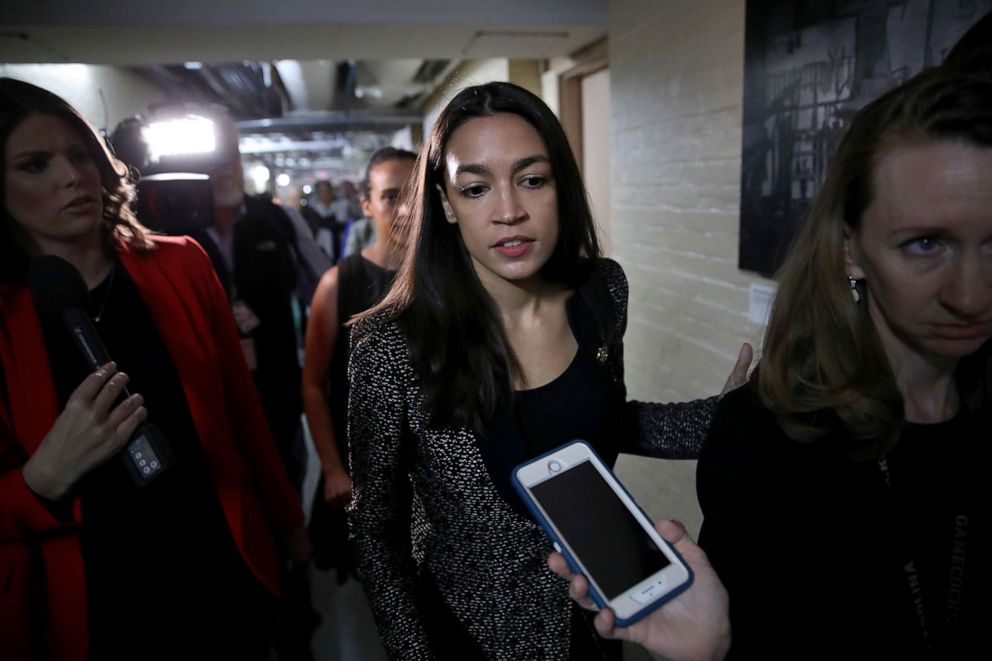
"I think impeachment, what's also tough about this conversation is when we say impeachment a lot of people don't know what that process means in the House," Rep. Alexandria Ocasio-Cortez, D-N.Y, said. "I think that right now what we need to do is at least be on that track and at least be in the process of impeachment."
For months, Pelosi has attempted to keep her caucus in line, urging them to withhold calls for impeachment in order to focus on the Democrats' legislative agenda. She has openly downplayed the prospects of successfully impeaching Trump, given the lack of bipartisan support for impeachment and a Republican firewall in the Senate.
But after Michigan Republican Rep. Justin Amash broke ranks with his GOP colleagues and said he believes President Trump "engaged in impeachable conduct," some Democrats believe Pelosi is running out of excuses.
Texas Democratic Rep. Sheila Jackson Lee said she will introduce a "Resolution of Investigation" this week, asking the full House of Representatives to authorize an investigation intended to determine whether impeachment powers should be exercised.
"What the American people want and deserve is deliberate and judicious action by the United States Congress," she tweeted. "We have to educate before we activate. Just like the Nixon tapes did. I will be introducing such a resolution. The time is now that Congress refuses to accept a rejection of its legal requests."
Democrats in support of launching an impeachment inquiry believe opening the inquiry would help streamline Democrats' investigations and strengthen their hand in the courts as they battle with the Trump administration over information and testimony. They have also said that opening the inquiry wouldn't necessarily lead to a full House vote to refer the matter to the Senate for a trial.
Pelosi and her top lieutenants, in their rebuttal to Democrats now pushing for impeachment, have said that the majority has not exhausted all of their options to force the administration to heel. They have floated changing House rules to levy fines on individuals who flout congressional subpoenas, among other possibilities.
"We still have unexhausted avenues here," Pelosi told Democrats in a closed-door meeting Monday, according to an aide in the room.
House Majority Leader Steny Hoyer said the decision to proceed on impeachment will ultimately be "a collective judgment" from Democrats.
"I'm not saying that the Caucus is going to vote on it, but what I'm saying is there will be discussions among the leadership and among the Caucus as to whether or not we have reached a point where it is clear that the responsibility is to move ahead on that. I don't think we're there at this point in time," Hoyer, D-Md., told reporters Tuesday. "I don't probably think there's any Democrat who probably wouldn't in their gut say, you know, he's done some things that probably justify impeachment.
"The majority of Democrats continue to believe that we need to continue to pursue the avenue that we've been on in trying to elicit information, testimony, review the Mueller report, review other items that have gone on," he continued. "And, you know, if the facts lead us to a broader action, so be it."
ABC News' Benjamin Siegel and Allie Pecorin contributed to this report.




